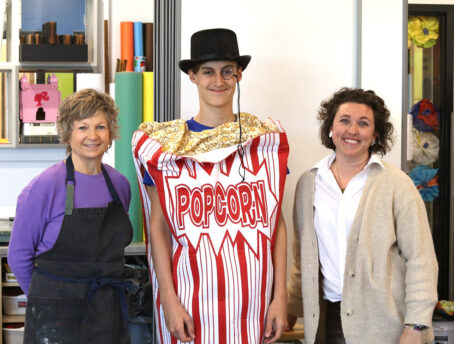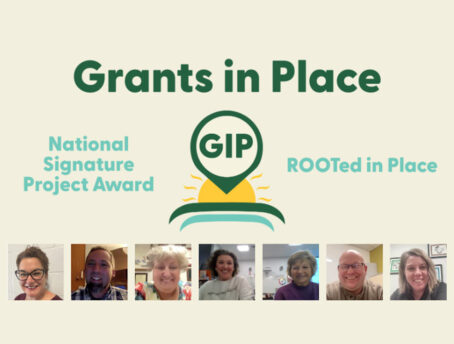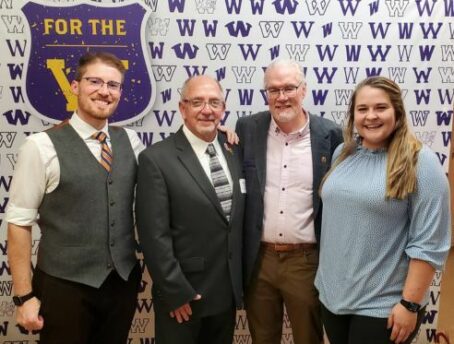Written by John Glasgow, RSC Research Assistant
Nestled behind the historic county courthouse and a log cabin from the area’s pioneer days is a local insurance agency which houses a tireless advocate for local philanthropy and community action in Knoxville, Illinois.
“I really do think that people…want to do good. It feels good to help people and to be part of something that’s helping other people in your community.”
Since 2015, Peg Bivens and the Knoxville Community Fund, a fund of the Galesburg Community Foundation, have strived to provide their small town with the structure, advocacy, and funds needed to address a number of challenges which rural communities typically face but are hard pressed to find methods of tackling. After initial fundraising earlier that year to officially launch the fund, Bivens found the Knoxville community eager to pitch in and do what they could to work for their home.
“So many times, you’re asked to give money but there’s so much distance between your dollar and where it goes that you don’t get that feedback. That’s why I think that doing things in your own community is so much more satisfying.” Bivens reflected.
Over the past five years, Bivens and the Knoxville Community Fund have found themselves funding projects which impact nearly every aspect of daily life in Knoxville; chief among them being the local school district. Like elsewhere in rural America, the area school district is an important cornerstone for the community, and often exists as the area’s economic and social lifeline; a point that Bivens stresses:
“It’s part of your identity. It makes activity in your community. So, it’s really important to small communities to still have their school and many small communities have had to give that up just because of a numbers issue.”
That numbers issue is something many small towns around Knoxville and across the country have had to face. Doing what they can to help ease the burden on students, teachers, and the district alike, Bivens and the Knoxville Community Fund have already funded a series of “tangible” projects in the local schools, supporting everything from anti-bullying curriculum and supplies for the life skills class to a motivational speaker for students and materials for the district robotics program.
However, Bivens along with the rest of the Fund’s “Steering Committee” have launched a new program with the hopes of focusing on broader challenges in the community:
“Last year we said ‘let’s do grants, let’s invite people to do grants for some kind of a social need’…and that’s where we latched onto this teacher mini-grant program.”
Teachers everywhere hold the unique privilege of becoming a part of their students’ daily lives and sharing in students’ joys and concerns. Yet this privilege also invites a strong sense of duty and responsibility in educators toward their students. Often this means that teachers dedicate both time and resources outside of what is provided during the regular school day to support their students in whatever social need arises. This relationship is what attracted Bivens and the Knoxville Community Fund in their search for a way to assist the community further.
“Often times the classroom teachers are the ones that are closest to their students and are in best position to ascertain some needs, but there aren’t always funds available to meet those needs.”
Seeing that teachers in the small community were best fit to know the social needs of their students, Bivens and the Knoxville Community Fund created the Teacher Mini-grant Program as a way to directly support those teachers, and the community in general. Bivens hopes that providing these funds will take some of the stresses off teachers when serving in their community and social roles.
The grant itself consists of a number of small cash awards to go toward projects and programs that would typically fall outside the school district’s approved curriculum or funding structure.
“They’re really meant to be a little extra cash for the classroom teacher; just helping instead of these things being funded out of the classroom teacher’s pocket. In that way we hope to show the classroom teachers how much the community supports their efforts, appreciates and supports…going above and beyond what’s the normal hard budgeting.”
Although certain guidelines do exist to give the grant structure, Bivens also noted that the Steering Committee purposefully left defining the project or program open to the teacher’s interpretation.
“We’re hoping that we get requests that are a little bit innovative, a little bit creative, and outside the box of what’s being done…Whether it’s for supplies, or whether it’s ‘this particular class needs to have an outing or activity’ or something that is just outside the normal budget, and the teacher recognizes that.”
Bivens points out that “whatever it is, it puts the empowerment into the hands of the people who are close to it.”
“By creating the Teacher Mini-grant Program we’re hoping that it will be an ongoing [program], so that teachers get the idea that there is this program…helping to tap into some of the social need aspects that are available in our school.”
Applications for this inaugural round of grant-making were submitted at the beginning of April with four finalists being selected in mid-May. The chosen projects represent a broad effort to expand access to materials, equipment, and services within the district as well as to foster “design thinking skills,” promote “student-led projects based on student voice and choice,” and increase collaboration between students, the school, and the larger community.
Two of the finalists focused on furthering STEM programming for the junior high school. Under the “Hummingbird Kit STEM Integration” project, a new STEM elective course “will be created and co-taught by Katie Frey (science) and Amy Hopper (math).” This course will allow students to use in-class studies, technology, and their own interests to develop projects which help address “real-world problems.” Along with this, the “Getting STEM Started” proposal seeks to strengthen and support the junior high school’s burgeoning STEM elective by purchasing equipment, training students, and further support “21st century skills.”
A third grant recipient also similarly addresses the need for more education equipment by proposing to buy updated calculators for the district’s AP Calculus course. With this project, calculus students “will take the Calculus AP Exam for the first time this year.” In order to do this however, the school needed new calculators which could process the first and second derivatives encountered during the exam.
For the final chosen project, the submitting teacher sought to expand the “Knoxville Resiliency Project” into the high school. Building on the district’s recent anti-bullying campaign and student life skills instruction, this project continues that work by offering a “positive approach to bullying remediation” at the high school. Integral to this effort, “students will learn skill sets such as self-control and self-efficacy…” while “teachers will be trained as Resiliency Coaches and learn how to build genuine connections within the classroom and to facilitate activities that help students learn how to effectively resolve conflicts…”
Along with the excitement and hope this new program generates, Bivens is overjoyed at the prospect of the Knoxville community coming together again to support a cause that benefits teachers, students, and the community.
“Nothing in any community is stand alone and in a small community it is especially important for people to work collaboratively, to involve all members in the community in whatever it is…and I think that is just so vital, especially for a small town, for Knoxville, and that’s one of the things that our community fund really tries to do whenever we can.”
We invite you to learn more about how the Galesburg Community Foundation partners with Monmouth College to anchor our Illinois Hub and support our national programming office.




